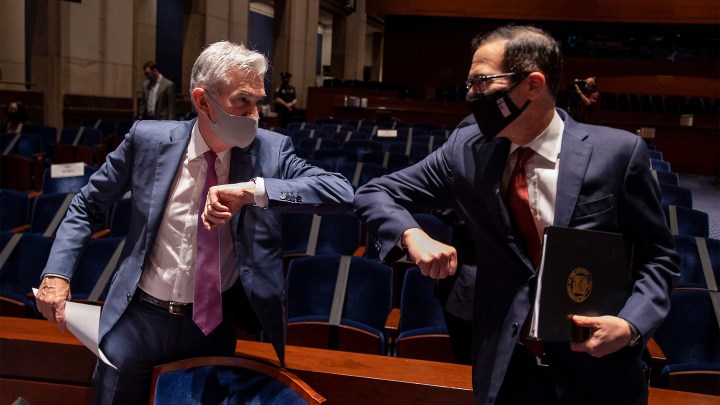
Post COVID-19, the Fed and the Feds will have to tread carefully
Post COVID-19, the Fed and the Feds will have to tread carefully

This pandemic is unlike anything we have seen in modern times. So when you look at it from an economic perspective, it doesn’t fit neatly into a box. And that makes managing it a real challenge for the people on the front lines of the economic war against the virus.
This economy is being pulled, torn even, in different directions. Prices are rising in some sectors, for example, and falling in others.
“You’ve got some parts of the economy where the main story is a shortage of supply,” said David Wilcox, a fellow at the Peterson Institute for International Economics and former head of the Federal Reserve domestic economics division. Food prices, for example, are up nearly 5% in the last 12 months, he said, in part because supply is down or disrupted.
“We’ve all seen the stories about meat processing plants and so forth, Wilcox said. “Or in other cases, it might be snarled supply lines from other countries.”
But in much of the economy, the issue is too little demand — people aren’t buying.
“A lot of families are just really on the financial brink,” Wilcox said.
They’re spending less, especially on things like energy and transportation, where inflation is slowing down the most. But this whole situation has some people like Markus Brunnermeier, a professor of economics at Princeton University, anxious.
“Right now, it’s a fairly unstable situation because we live in a world of high uncertainty,” he said.
Brunnermeier said there’s a danger of what he calls an “inflation whipsaw effect,” where the country lunges from low inflation to high inflation.
“We are not spending now much because everyone is very scared, but once things ease up we say, ‘now we catch up,'” he explained. “We spend again and the demand is kicking in, and that might lead to inflationary pressures. … So that’s a danger which might come down the road,” Brunnermeier said.
That means that on the other side of this crisis, the Federal Reserve will have to be extremely careful about how it guides the economy.
“It just means if you make a small error, it will have much bigger implications,” Brunnermeier said.
That is, however, a problem that is a little down the road. For now, the Fed isn’t worrying about inflation. It’s throwing everything it has at the economy to just keep people employed.
“I think the Fed’s biggest problem is that they are running out of tools,” said Ann Owen, a professor of economics at Hamilton College and former Fed economist. “What they really need is fiscal policy to help them do their job.”
In other words, she said, the Fed needs Congress and the White House to hurry up and come up with more coronavirus relief, because there is only so much that the central bank can do.
Correction (Aug. 3, 2020): A previous version of this story incorrectly stated how much food prices have risen in the last 12 months. The text has been corrected.
There’s a lot happening in the world. Through it all, Marketplace is here for you.
You rely on Marketplace to break down the world’s events and tell you how it affects you in a fact-based, approachable way. We rely on your financial support to keep making that possible.
Your donation today powers the independent journalism that you rely on. For just $5/month, you can help sustain Marketplace so we can keep reporting on the things that matter to you.












